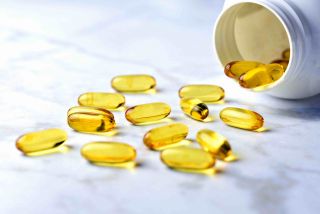Fish oil supplements offer ‘little or no benefit' to health, study finds
The findings could shake up the supplement industry

New research might make you think twice about taking fish oil supplements as part of your daily healthcare routine.
A new study has found that taking fish oil supplements is likely to have no significant impact on health - despite previous claims that it could lower the risk of cancer, heart disease and dementia.
The research - which was carried out by the University of Anglia (UEA) - studied 100,000 participants, who were asked to consume more omega-3 fats in supplement form or maintain their usual intake for at least a year.
Results found that if 1,000 people took supplements for approximately four years, the effects on their health (both positively or negatively) would be minimal.
Dr Lee Hooper - from UEA's Norwich Medical School - says the research is important because it adds to the growing evidence that omega-3 supplements are failing to do what they advertise.
He said, "Our previous research has shown that long-chain omega 3 supplements, including fish oils, do not protect against conditions such as anxiety, depression, stroke, diabetes or death.
"In fact, we found that they may very slightly increase cancer risk, particularly for prostate cancer."
Sign up for the woman&home newsletter
Sign up to our free daily email for the latest royal and entertainment news, interesting opinion, expert advice on styling and beauty trends, and no-nonsense guides to the health and wellness questions you want answered.

This study - which was funded by the World Health Organisation (WHO) - follows more than 80 studies in 2019 which found no evidence that omega-3 offers health benefits to those with type 2 diabetes. Further studies last year also suggested that supplements offer little to no protection against heart disease.
Dr Hooper added that with growing environmental concerns surrounding the fishing industry, it seems "unhelpful" for people to continue taking supplements that give "little or no benefit" to health.
However, it’s worth pointing out that this study directly refers to supplements, rather than the omega-3 which comes from eating actual fish.
The NHS advises that people should eat two portions of fish per week - including one serving of oily fish, such as salmon, fresh tuna or mackerel, in order to consume enough "good" fats.
Lizzie Thomson is a regular contributor to woman&home, and also contributes to Metro.co.uk, Ideal Home, Culture Trip, and Evening Standard, covering all things lifestyle.
-
 What flower seeds to sow in April: 8 things to plant now, before it's too late
What flower seeds to sow in April: 8 things to plant now, before it's too lateThe gardening experts reveal the best flower seeds to sow in April for a gorgeous summer garden
By Holly Crossley Published
-
 32 of the best foods to have in the evening
32 of the best foods to have in the eveningThe best foods to have in the evening complement a healthy sleep routine with plenty of vitamins and minerals - but aren't too filling
By Grace Walsh Published